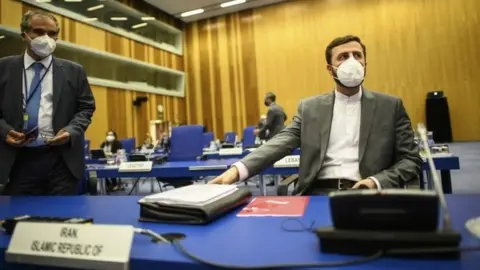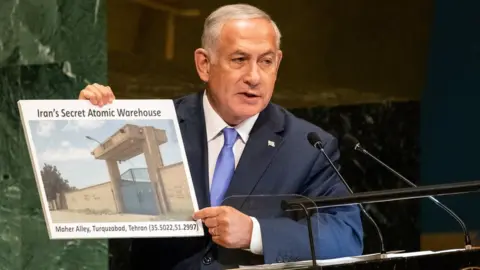IAEA urges Iran to explain uranium particles at undeclared sites
 EPA
EPAThe head of the global nuclear watchdog is deeply concerned that Iran has still not explained the presence of uranium particles at three undeclared sites.
Rafael Grossi told the International Atomic Energy Agency's member states that nuclear material or contaminated equipment had been at the locations.
The lack of progress "seriously affects the ability of the agency to provide assurance of the peaceful nature of Iran's nuclear programme", he warned.
Iran has insisted it is co-operating.
It is thought that possible nuclear-related activities took place at the locations in the early 2000s, long before Iran struck a deal with world powers that placed limits on its nuclear programme.

Iran nuclear crisis: The basics
- World powers don't trust Iran: Some countries believe Iran wants nuclear power because it wants to build a nuclear bomb - it denies this.
- So a deal was struck: In 2015, Iran and six other countries reached a major agreement. Iran would stop some nuclear work in return for an end to harsh penalties, or sanctions, hurting its economy.
- What is the problem now? Iran re-started banned nuclear work after former US President Donald Trump pulled out of the deal and re-imposed sanctions on Iran. Even though new leader Joe Biden wants to re-join, both sides say the other must make the first move.

Iran insists it has never sought to develop a nuclear weapon, but evidence collected by the IAEA suggests that until 2003 it conducted "a range of activities relevant to the development of a nuclear explosive device".
In 2019, the IAEA requested that Iran answer questions about possible undeclared nuclear activities and materials.
 Getty Images
Getty ImagesThe move came after Israel's Prime Minister Benjamin Netanyahu said it had obtained documents showing Iran surreptitiously continued nuclear weapons work beyond 2015.
Mr Netanyahu also identified a "secret atomic warehouse" in a district of Tehran, believed to be where IAEA inspectors subsequently detected the presence of "natural uranium particles of anthropogenic [man-made] origin" and "isotopically altered particles of low enriched uranium". Enriched uranium is used to make reactor fuel, but also nuclear weapons.
Inspectors also detected uranium particles at two more unidentified locations - one where there was "the possible presence... of natural uranium in the form of a metal disc", and another where there was "possible use or storage of nuclear material and/or conducting of nuclear-related activities".
They also asked questions about a fourth location where nuclear material was possibly used and stored, and where outdoor, conventional explosive testing may have taken place.
"After many months, Iran has not provided the necessary explanation for the presence of the nuclear material particles at any of the three locations," Mr Grossi said in a statement to the IAEA's Board of Governors on Monday.
He added: "I am deeply concerned that nuclear material has been present at the three undeclared locations in Iran and that the current locations of this nuclear material are not known by the agency. Nor has Iran answered the questions with regard to the other undeclared location, or clarified the current location of natural uranium in the form of a metal disc."
Last week, the head of the Atomic Energy Organisation of Iran wrote to Mr Grossi to assure him that it was "making maximum efforts to co-operate with the agency in a substantive manner"
"We strongly expect that this mutual co-operation will soon yield practical results in this regard," Ali Akbar Salehi said.
Mr Grossi also told the IAEA's board that its verification and monitoring activities had been affected by Iran's decision to reduce co-operation with the agency - its latest breach of the nuclear deal in retaliation for the sanctions reinstated by the US when it withdrew in 2018.
Iran has agreed to store footage from surveillance cameras at nuclear sites until 24 June as a gesture of "good faith" while indirect talks on lifting the sanctions continue with the Biden administration. The footage will be deleted if there is no breakthrough.
